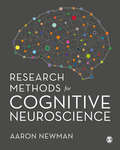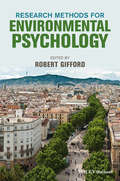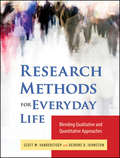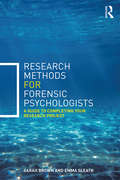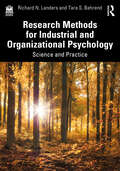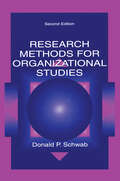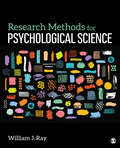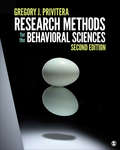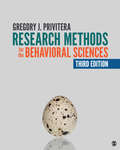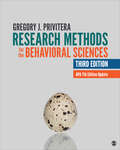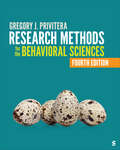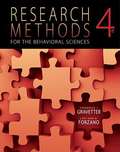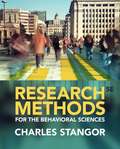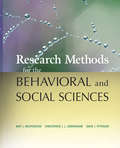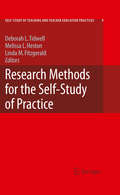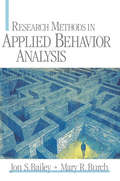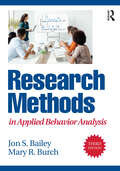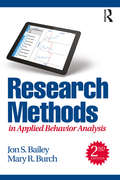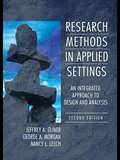- Table View
- List View
Research Methods for Cognitive Neuroscience
by Dr. Aaron NewmanThis fresh, new textbook provides a thorough and student-friendly guide to the different techniques used in cognitive neuroscience. Given the breadth of neuroimaging techniques available today, this text is invaluable, serving as an approachable text for students, researchers, and writers. This text provides the right level of detail for those who wish to understand the basics of neuroimaging and also provides more advanced material in order to learn further about particular techniques. With a conversational, student-friendly writing style, Aaron Newman introduces the key principles of neuroimaging techniques, the relevant theory and the recent changes in the field.
Research Methods for Cognitive Neuroscience
by Dr. Aaron NewmanThis fresh, new textbook provides a thorough and student-friendly guide to the different techniques used in cognitive neuroscience. Given the breadth of neuroimaging techniques available today, this text is invaluable, serving as an approachable text for students, researchers, and writers. This text provides the right level of detail for those who wish to understand the basics of neuroimaging and also provides more advanced material in order to learn further about particular techniques. With a conversational, student-friendly writing style, Aaron Newman introduces the key principles of neuroimaging techniques, the relevant theory and the recent changes in the field.
Research Methods for Environmental Psychology
by Robert GiffordCovering the full spectrum of methodology, the timely and indispensible Research Methods for Environmental surveys the research and application methods for studying, changing, and improving human attitudes, behaviour and well-being in relation to the physical environment. The first new book covering research methods in environmental psychology in over 25 years. Brings the subject completely up-to-date with coverage of the latest methodology in the field The level of public concern over the impact of the environment on humans is high, making this book timely and of real interest to a fast growing discipline Comprehensively surveys the research and application methods for studying, changing, and improving human attitudes, behavior, and well-being in relation to the physical environment Robert Gifford is internationally recognised as one of the leading individuals in this field, and the contributors include many of the major leaders in the discipline
Research Methods for Everyday Life
by Deidre D. Johnson Scott W. VanderstoepThis book offers an innovative introduction to social research. The book explores all stages of the research process and it features both quantitative and qualitative methods. Research design topics include sampling techniques, choosing a research design, and determining research question that inform public opinion and direct future studies. Throughout the book, the authors provide vivid and engaging examples that reinforce the reading and understanding of social science research. "Your Turn" boxes contain activities that allow students to practice research skills, such as sampling, naturalistic observation, survey collection, coding, analysis, and report writing.
Research Methods for Forensic Psychologists: A guide to completing your research project
by Sarah Brown Emma SleathResearch Methods for Forensic Psychologists is an accessible and comprehensive textbook that introduces students to the research process in forensic psychology. Adopting a problem-based learning approach, this book offers a ‘how-to’ guide to the whole research process and empowers readers to develop their own programme of research, from initial vague ideas, to developing a research question, to carrying out a methodologically rigorous research project, to disseminating the findings. The text is centred on five case studies, sufficiently different in nature to address the most common research methodologies. Each case study is linked with a specific research question that will be used to illustrate the research process throughout the rest of the book. Topics covered in the book include: Design and Planning, including a literature search, a discussion of different sorts of data, practical and feasibility issues, research ethics and developing a research proposal. Conducting research, including the submission of ethics proposals and responding to feedback, collecting data and dealing with the problems and challenges of analysing data. Dissemination of findings, an overview of the different types of papers, with examples listed and other methods of disseminating findings discussed, such as conference presentations and the use of social media. Throughout, issues of common difficulty or confusion are highlighted and activities are provided for readers to consider and apply the information discussed further. Additional reading sections and summaries are also provided at the end of each chapter. This book is essential reading for advanced students in Forensic Psychology, as well as trainees and practitioners within relevant forensic psychology organisations.
Research Methods for Industrial and Organizational Psychology: Science and Practice
by Richard N. Landers Tara S. BehrendThis important and useful book offers a clear and comprehensive foundation for research methods in industrial and organizational (I-O) psychology. The text provides readers with a key understanding of the research, theory, and practice needed towards becoming a research methods expert.The use of trustworthy and rigorous research methods is foundational to advancing the science of industrial and organizational psychology and its practice in the field. Understanding this, the authors have paired straightforward, plainly written explanations in a conversational tone with illuminating diagrams and illustrations. Many descriptions are followed by in-depth demonstrations and examples from relevant software, including SPSS, R, and even Excel when it’s the best option available. Insightful and accessible, the text covers the full gamut of I-O research methods, from theory to practice and everywhere between.Paired with a detailed instructor’s manual, this book serves as a gentle but thorough introduction to the complex world of research methods in I-O psychology for both master’s and Ph.D. students, as well as researchers, academics, and practitioners.
Research Methods for Organizational Studies
by Donald P. SchwabThis revision of a best selling research methods textbook introduces social science methods as applied broadly to the study of issues that arise as part of organizational life. These include issues involving organizational participants such as managers, teachers, customers, patients and clients, and transactions within and between organizations. In this new edition, chapter 19 now focuses on describing the modeling process and outcomes. An entirely new chapter 20 now addresses challenges to modeling. It goes substantially beyond a discussion of statistical inference. It also discusses issues in interpreting variance, explained estimates, and standardized and unstandardized regression coefficients. A new capstone chapter 21 helps students recognize good research. This textbook is accompanied by an Instructor's Manual for course use.
Research Methods for Psychological Science
by William J. RayWritten by experimental research expert, Dr. William J. Ray, Research Methods for Psychological Science introduces students to the principles and practice of conducting research in psychology in an engaging, story-telling format. Ray helps students understand how research increases our understanding of ourselves and our environment and how logic and best practices can increase our understanding of human behavior. Whether their future roles will be researchers, consumers of research, or informed citizens, students will learn the importance of developing testable hypotheses, how to evaluate new information critically, and the impact of research on ourselves and our society. Based on Ray’s influential textbook, Methods Toward a Science of Behavior and Experience, the book offers up-to-date pedagogy, structure, and exercises to reinforce the student’s learning experience.
Research Methods for Psychological Science
by William J. RayWritten by experimental research expert, Dr. William J. Ray, Research Methods for Psychological Science introduces students to the principles and practice of conducting research in psychology in an engaging, story-telling format. Ray helps students understand how research increases our understanding of ourselves and our environment and how logic and best practices can increase our understanding of human behavior. Whether their future roles will be researchers, consumers of research, or informed citizens, students will learn the importance of developing testable hypotheses, how to evaluate new information critically, and the impact of research on ourselves and our society. Based on Ray’s influential textbook, Methods Toward a Science of Behavior and Experience, the book offers up-to-date pedagogy, structure, and exercises to reinforce the student’s learning experience.
Research Methods for the Behavioral Sciences
by Dr Gregory J. PriviteraThe Second Edition of the award-winning Research Methods for the Behavioral Sciences employs a problem-focused approach that fully integrates the decision tree—from choosing a research design to conducting statistical analysis and communicating results. With a conversational, student-friendly writing style, Gregory J. Privitera shows how methods and analysis work together and enable the testing of hypotheses through use of the scientific method. Outstanding pedagogy, current examples, and robust resources empower students to approach their study and application of research methods with confidence.
Research Methods for the Behavioral Sciences
by Dr Gregory J. PriviteraThe Second Edition of the award-winning Research Methods for the Behavioral Sciences employs a problem-focused approach that fully integrates the decision tree—from choosing a research design to conducting statistical analysis and communicating results. With a conversational, student-friendly writing style, Gregory J. Privitera shows how methods and analysis work together and enable the testing of hypotheses through use of the scientific method. Outstanding pedagogy, current examples, and robust resources empower students to approach their study and application of research methods with confidence.
Research Methods for the Behavioral Sciences
by Dr Gregory J. PriviteraResearch Methods for the Behavioral Sciences, Third Edition employs a problem-focused approach to present a clear and comprehensive introduction to research methods. Award-winning teacher, author, and advisor Gregory J. Privitera fully integrates the research methods decision tree into the text to help students choose the most appropriate methodology for the research question they are seeking to answer. Speaking to readers directly, Privitera empowers students to view research methods as something they can understand and apply in their daily lives.
Research Methods for the Behavioral Sciences
by Dr Gregory J. PriviteraResearch Methods for the Behavioral Sciences, Third Edition employs a problem-focused approach to present a clear and comprehensive introduction to research methods. Award-winning teacher, author, and advisor Gregory J. Privitera fully integrates the research methods decision tree into the text to help students choose the most appropriate methodology for the research question they are seeking to answer. Speaking to readers directly, Privitera empowers students to view research methods as something they can understand and apply in their daily lives.
Research Methods for the Behavioral Sciences
by Gregory J. PriviteraThe Updated Third Edition has been fully revised for the seventh edition of the Publication Manual of the American Psychological Association (2020), both in the APA style sections within content and the references. The language within the text has been updated to be as inclusive as possible regarding all aspects of identity. The APA sections on style, paper preparation, and ethics have been updated and the text itself has been formatted in the 7th edition style to better reflect the latest style guidance. Both comprehensive and clear, Research Methods for the Behavioral Sciences, Third Edition author Gregory J. Privitera employs a problem-focused approach to introduce research methods. A conversational writing tone speaks to learners directly, empowering students to view research methods as something they are capable of understanding and applying. Within each chapter, students draw conclusions by following the scientific process. To do enable this, Privitera fully integrates the research methods decision tree—from choosing a research design to choosing an appropriate statistic—to encourage students to select the most appropriate methodology for the research question they′re seeking to answer. Greg Privitera covers the full scope of methodologies from non-experimental to quasi-experimental to experimental in a straightforward, unbiased manner.
Research Methods for the Behavioral Sciences
by Gregory J. PriviteraThe Updated Third Edition has been fully revised for the seventh edition of the Publication Manual of the American Psychological Association (2020), both in the APA style sections within content and the references. The language within the text has been updated to be as inclusive as possible regarding all aspects of identity. The APA sections on style, paper preparation, and ethics have been updated and the text itself has been formatted in the 7th edition style to better reflect the latest style guidance. Both comprehensive and clear, Research Methods for the Behavioral Sciences, Third Edition author Gregory J. Privitera employs a problem-focused approach to introduce research methods. A conversational writing tone speaks to learners directly, empowering students to view research methods as something they are capable of understanding and applying. Within each chapter, students draw conclusions by following the scientific process. To do enable this, Privitera fully integrates the research methods decision tree—from choosing a research design to choosing an appropriate statistic—to encourage students to select the most appropriate methodology for the research question they′re seeking to answer. Greg Privitera covers the full scope of methodologies from non-experimental to quasi-experimental to experimental in a straightforward, unbiased manner.
Research Methods for the Behavioral Sciences
by Gregory J. PriviteraResearch Methods for the Behavioral Sciences, Fourth Edition employs a problem-focused approach to present a clear and comprehensive introduction to research methods. Award-winning teacher and author Gregory J. Privitera fully integrates the research methods decision tree into the design process to help students choose the most appropriate method for the research question they are seeking to answer. The book’s conversational writing style and student-focused features empower students to view research methods as something they can both understand and apply. Over the course of the book, students learn how to structure a study to answer a research question and navigate through the process of choosing an appropriate analysis or statistic to write a research report. New elements to the Fourth Edition include a new standalone chapter on qualitative research, assumptions testing throughout chapters on quantitative research, and updated examples and figures to communicate the latest updates in behavioral science research.
Research Methods for the Behavioral Sciences
by Gregory J. PriviteraResearch Methods for the Behavioral Sciences, Fourth Edition employs a problem-focused approach to present a clear and comprehensive introduction to research methods. Award-winning teacher and author Gregory J. Privitera fully integrates the research methods decision tree into the design process to help students choose the most appropriate method for the research question they are seeking to answer. The book’s conversational writing style and student-focused features empower students to view research methods as something they can both understand and apply. Over the course of the book, students learn how to structure a study to answer a research question and navigate through the process of choosing an appropriate analysis or statistic to write a research report. New elements to the Fourth Edition include a new standalone chapter on qualitative research, assumptions testing throughout chapters on quantitative research, and updated examples and figures to communicate the latest updates in behavioral science research.
Research Methods for the Behavioral Sciences (4th Edition)
by Frederick J. Gravetter Lori-Ann B. ForzanoBestselling statistics author, Fredrick J. Gravetter, and co-author Lori-Ann B. Forzano have written a text for research methods that helps students see how interesting and exciting experimental and non-experimental research can be. Inviting and conversational, RESEARCH METHODS FOR THE BEHAVIORAL SCIENCES, Fourth Edition, leads students through the research process from start to finish. The text opens with tips and strategies for generating research ideas, moves to selecting measures and participants, and then offers an examination of research strategy and design. This step-by-step approach emphasizes the decisions researchers must make at each stage of the process. The authors avoid a "cookbook" approach to the facts by linking terminology with applied concepts; their "lecture in a book" style makes the text accessible to students by emphasizing discussion and explanation of topics. Each chapter ends with a set of student exercises and activities. Examples and content throughout the book reflect the most current APA guidelines.
Research Methods for the Behavioral Sciences (Fifth Edition)
by Charles StangorThe author provides succinct explanations for a full range of methods, including descriptive, correlational, experimental, and quasi-experimental research designs.
Research Methods for the Behavioral and Social Sciences
by Christopher J. Cunningham Bart L. Weathington David J. PittengerA comprehensive introduction to research methods and best practices for designing,conducting, interpreting, and reporting findings This text is designed to develop in students a passion for conducting research and an understanding of the practical value of systematic information- gathering and decision-making. It features step-by-step coverage of the research process including research design, statistical considerations, and guidance on writing up and presenting results. Recognized leaders in the field—authors Bart Weathington, Christopher Cunningham, and David Pittenger—present: Introductions to multiple research designs—including single-participant, multi-group, longitudinal, correlational, and experimental designs—accompanied by examples Bibliographic research and methods for appropriate sampling Identifying, developing, and evaluating reliable and valid approaches to measurement The issues and steps common to all single-factor and multifactor studies, as well as single-subject and nonexperimental methods How to summarize research in writing that conforms to the editorial guidelines of the American Psychological Association A comprehensive review of research methods and the statistical concepts that support them, Research Methods for the Behavioral and Social Sciences offers the best techniques for studying behavior and social phenomena.
Research Methods for the Self-Study of Practice
by Deborah Tidwell Melissa Heston Linda FitzgeraldThis volume presents 13 studies that provide concrete and authentic illustrations of self-study as it naturally unfolds across different educational settings. Each chapter provides in-depth descriptions of the context, method choices and processes used for self-study research, highlighting how researchers gather, analyze and make sense of data. All of these studies offer rich examples of the recursive processes so important in self-study research. The first section highlights the use of text as data to examine the meaning and value of teacher education practices. The second features self-studies using discourse and dialogue as data and often as actual analysis tools for examining practice. The third presents studies in which different forms of visual representations are used as data that illuminate the ideas, assumptions and experiences underlying practice. The final section presents self-studies focused on the impact of practice on teacher education programs, students, and faculty-student interactions.
Research Methods in Applied Behavior Analysis
by Jon S. Bailey Mary R. BurchThis very practical, how-to text provides the beginning researcher with the basics of applied behavior analysis research methods. In 10 logical steps, this text covers all of the elements of single-subject research design and it provides practical information for designing, implementing, and evaluating studies. Using a pocketbook format, the authors provide novice researcher with a "steps-for-success" approach that is brief, to-the-point, and clearly delineated.
Research Methods in Applied Behavior Analysis
by Jon S. Bailey Mary R. BurchResearch Methods in Applied Behavior Analysis, third edition, is a practical and accessible text that provides the beginning researcher with a clear description of how behavior analysts conduct applied research and submit it for publication.In a sequence of ten logical steps, this text covers the elements of single-case research design and the practices involved in organizing, implementing, and evaluating research studies. This revision covers important new topics for consideration when designing a study, including ecological validity, procedural fidelity, and the consecutive controlled case series design, which includes replications of single-cases and the statistical analysis of accumulated studies. Also included are chapter summaries, specific tips for master’s and doctoral researchers, and recommended procedures for BCBA consultants.Rich with details from the authors’ vast experience and numerous examples from published research, this text is an indispensable resource for students of applied behavior analysis and for practicing behavior analysts.
Research Methods in Applied Behavior Analysis (2nd Edition)
by Jon S. Bailey Mary R. BurchResearch Methods in Applied Behavior Analysis, 2nd edition, is a practical text that provides the beginning researcher with a clear description of how behavior analysts conduct applied research and submit it for publication. In a sequence of ten logical steps, the text covers the elements of single-case research design and the practices involved in organizing, implementing, and evaluating research studies. This revision includes new material on how to critique a journal article and how to extract treatment ideas from published studies. The novice researcher receives a "steps for success" approach that is brief, useful, to the point, and clearly delineated.
Research Methods in Applied Settings
by George A. Morgan Jeffrey A. Gliner Nancy L. LeechThrough its integrated approach to quantitative research methods, this text teaches readers how to plan, conduct, and write a research project and select and interpret data so they can become better consumers of research. This is not a statistics book--there are very few formulas. Rather, this book helps students master which statistic to use when and how to interpret the results. Organized around the steps one takes in conducting a research project, this book is ideal for applied programs and for those who want to analyze and evaluate research articles. Having taught in a variety of departments, the authors have a good grasp of the research problems faced by master's and doctoral students in diverse areas of the behavioral and social sciences. Text adopters applaud the book's clarity. Students are often confused by other texts' use of inconsistent terminology. To avoid this confusion, the authors present a semantically consistent picture that emphasizes five research approaches-- randomized experimental, quasi-experimental, comparative, associational, and descriptive. The authors then show how these approaches lead to three kinds of research designs which, in turn, lead to three groups of statistics with the same names. This consistent framework increases comprehension and the ability to apply the material. Numerous applied problems, annotated examples, and diagrams and tables further promote comprehension. Although the book emphasizes quantitative research, the value of qualitative research is introduced. This extensively revised edition features more than 50% new material including: A new chapter on the evidence-based approach that emphasizes the importance of reporting confidence intervals and effect sizes and the increased use of meta-analysis. An increased emphasis on evaluating research including an 8 step plan for evaluating research validity (Chs. 23 & 24) and its application to the 5 sample studies used throughout the book (Ch. 25). Lots of practical advice on planning a research project (Ch. 2), data collection and coding (Ch. 15), writing the research report (Ch. 27), questions to use in evaluating a research article (Appendix E) and creating APA tables and figures (Appendix F). A new chapter on non-experimental approaches/designs (Ch. 7) including qualitative research. Web resources for students including critical thinking problems with answers and a sample outline of a research proposal. An earlier and expanded introduction to measurement reliability and validity to further emphasize their differences and importance. An extensively revised chapter on measurement validity consistent with the latest APA/AERA/NCME standards. Fewer chapters on inferential statistics with an increased focus on how their selection is related to the design of the study and how to interpret the results using significance testing and effect sizes and confidence intervals. Instructor's Resources with Power Points, test questions, answers to the application questions, and more. Intended for graduate research or quantitative/experimental methods/design courses in psychology, education, human development and family studies, and other behavioral, social, business, and health sciences, independent sections and chapters can be read in many orders allowing for flexibility in assigning topics. Due to its practical approach, this book also appeals to researchers and clinicians. Prior exposure to statistics and research methods is recommended.
